
One thing that experts and laymen alike are agreed on is that we currently live in the Information Age. The endless, relentless bombardment of our senses by information from any conceivable medium, in both well-known and abstract fields in this 21st century is truly unprecedented. And this has been driven by Information technology.
One remarkable effect of this technology is its aggressive demand for, and voracious consumption of data. But this is hardly surprising, because of course, information is data in processed form. Data is in fact the raw material from which Information is gotten.
Data is the raw, coarse, unprocessed grit which feeds the world’s giant information technology mill. Think of information as that product which comes out at the rear, now refined and edible. So, we could as well rename the Information age the Data Age, or more precisely, the age of Big data.
Big data, Sensor data and the Internet of things (IOT)
Gone are the days when big data included only population censuses, data from physical earth processes involving countless hours of observation and measurement, or other laboriously generated micro-electromechanical systems (MEMS) data which took too much time and human effort. Those days are over! Present technology has the capacity to create sophisticated sensors which are fitted into natural, mechanical and digital processes or devices in other to ‘sense’, detect and measure their output—and by so doing generate an enormous quantity of invaluable data. Sensor data.
The IOT works by providing a secure platform where sensor data from different devices can be shared, organized, integrated and analysed for use by researchers, entrepreneurs and organizations. All these, with minimal, if any, human agency. The good news is that the market for sensors and sensor data is really promising. According to experts, there will be 28 billion sensors in use by 2020, worth a staggering $1.7 trillion. IOT is the next frontier in the world of information technology, an inevitable product of the convergence of wireless technology, MEMS and sensor data.
The Internet of Everything
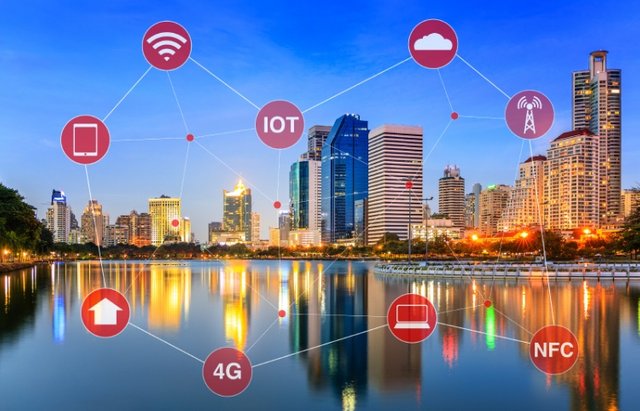
Take the case of personal health. There are sensor devices worn like wrist watches, which calculate the amount of distance walked, the changes in heart rate, and amount of used-up calories with distance. Refrigerators can be fitted with sensors to takes inventory of the amount, type and class of food consumed. Add all these to a host of smart gadgets which sense internal body temperature and that of the environment, and are all sending data to an IOT, and sharing data amongst themselves. With the appropriate analytics, this IOT could provide personalized diagnostic service and help prevent many avoidable health crises such as high blood pressure and diabetes.
Furthermore, imagine that this information about a single person is combined with those of millions of others. The patterns and sequences found would provide accurate and reliable information on eating habits and exercise, and this could literally revolutionize the public health industry!
For manufacturers, IOT sensor data can improve the production process and the product itself. IOT sensor data can improve transportation by integrating automobiles with radar and GIS mapping. Smart energy, smart homes and smart cities have now been touted as potential application areas for IOT.
But there’s a problem
There’s so much IOT sensor data being generated as individuals, companies, researchers and even governments invest hundreds of billions each year in buying and maintaining IOT sensors. Yet these data, after being captured, are stored away. Sensor data is not being shared amongst the organizations which need them.
However, companies need data for market information, governments need data to support policy and decision-making, researchers need data to advance knowledge etc. In fact, every single organization requires data and will be needing more of it. The problem is that most organizations cannot capture the data they need and must resort to buying this data from other organizations, but there’s currently no decentralized marketplace to buy and sell IOT sensor data.
The Solution - Databroker DAO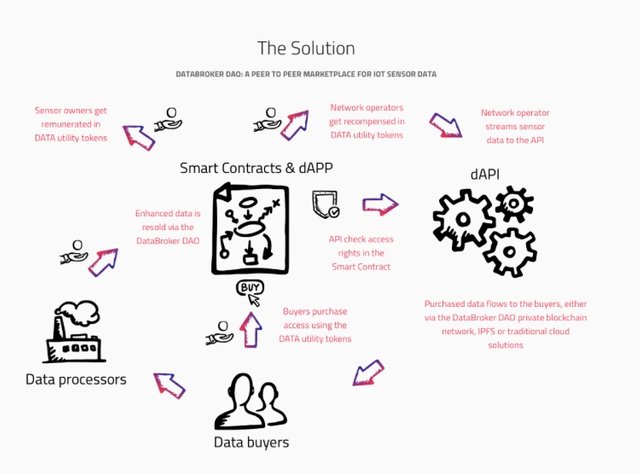
Databroker dao is the world’s first marketplace to buy and sell IOT sensor data. They estimate that if as little as 10% of data generated is sought by other organizations, then the value of data locked away will reach 120 billion next year. They have therefore created a new path for companies to tap into this wealth.
Who Can Chiefly Benefit From Databroker DAO ?
Databroker leverages Blockchain technology to help sensor-owning organizations securely store and monetize their sensor data. By linking together the major stakeholders in the market of sensor data (sensor owners, data buyers, data processors and gateway operators), databroker dao has created a decentralized system where anybody can access data generated anywhere in the world. By enabling sensor owners to sell directly to interested third party consumers, databroker dao provides the opportunity for these owners (be they manufacturing companies, transport and utility companies or governments) to recoup their sunk cost for IOT sensor hardware and software.
Sensor data buyers, on the other hand, have the opportunity to make use of the data without investing in the hardware. Companies can make reliable forecasts of market trends, decision support systems can better support business and organizational decision-making activities, and academics can push the boundaries of knowledge.
In an attempt to understand how buying and selling would work on the platform and to test some of the aforementioned features, you can try the beta version of the market place by visiting here.
DATABROKER DAO ALLIANCE
The databroker dao alliance is a collaboration among IOT stakeholders to meet the aforementioned goals and further their individual interests.
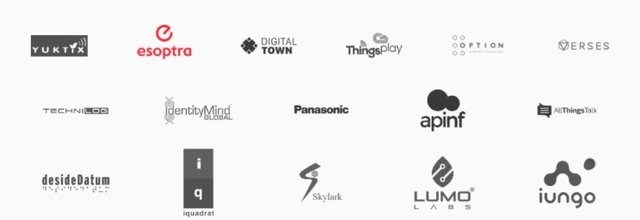
ROADMAP
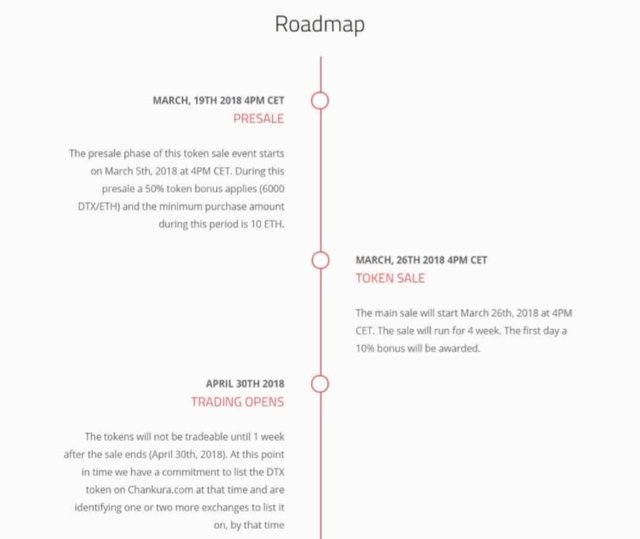
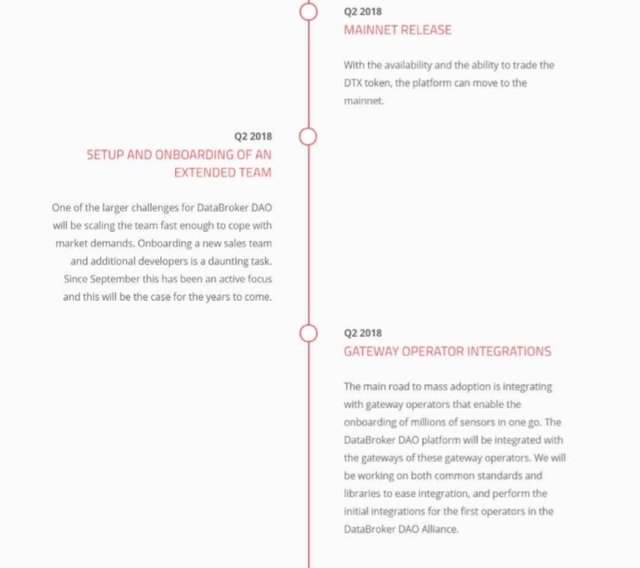
THE TEAM AND PARTNERS
The team headed by Matthew Van Niekerk and Roderik Van Der Veer, the co-founders, is made up of professionals with a vast wealth of experience in the IT development, digital and communication sector. The team also has experienced Blockchain developers and engineers who have all come together with the best idea to create this platform.

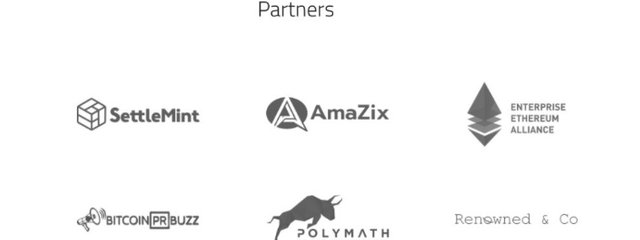
TOKEN SALE OVERVIEW AND DISTRIBUTION
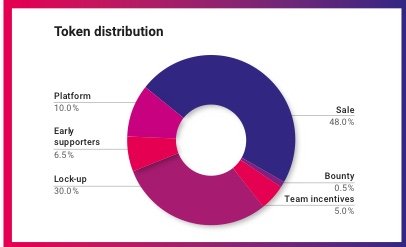
TOKEN SALE: 26TH APRIL – 30TH JUNE
TICKER: DTX
TOKEN TYPE: ERC20
TOKEN PRICE: 1 ETH = 4000 DTX (Private sale bonus: 50%)
FUNDRAISING GOAL : 27000 ETH (108,000,000DTX)
TOTAL TOKENS: 225,000,000
AVAILABLE FOR TOKEN SALE:48%
SOCIAL LINKS
TELEGRAM
ADDITIONAL LINKS
Databroker dao is a proponent for non monopolization of the data digital sphere. Join Databroker dao today in making data accessible by all in the software landscape.
Is this the first of its kind?
Downvoting a post can decrease pending rewards and make it less visible. Common reasons:
Submit
Not really, There are 3 commonly named projects that live in the same sphere: Streamr , IOTA and OceanProtocol. But DataBroker DAO takes a radically different approach, as It is built to interface with the large players in the ecosystem (manufacturers and gateway operators) in a non invasive way. ensuring a low friction environment. The only way to get market scale fast enough. you can get more in-depth knowledge about DataBroker dao from the whitepaper.
Downvoting a post can decrease pending rewards and make it less visible. Common reasons:
Submit
Databroker is the new revolution in the IOT
Downvoting a post can decrease pending rewards and make it less visible. Common reasons:
Submit
Yes it’s one of the most interesting and promising projects, and I believe, Databroker will be the main player in the IOT Sensor data market!
Downvoting a post can decrease pending rewards and make it less visible. Common reasons:
Submit
I have heard Databroker all around but I never really understood what it entailed, but after going through your write up, I can gladly say I understand much more better,
Thanks for making me understand the project better, I’m I still eligible to participate in the token sale?
Downvoting a post can decrease pending rewards and make it less visible. Common reasons:
Submit
You welcome, yes you are still eligible, the token sale would be ongoing till the 30th of july, or until the hardcap is reached. Feel free to join the telegram group, all your questions would be attended to.
Downvoting a post can decrease pending rewards and make it less visible. Common reasons:
Submit
Gwen, i love the way your work is so detailed and the pictures illustrating the messages passed inbetween the lines..
I hope to see more of your work and learn more.
Thanks for sharing this valuable piece.
I am me @brightfame
Downvoting a post can decrease pending rewards and make it less visible. Common reasons:
Submit
Thank you for going through it, expect more insightful reads
Downvoting a post can decrease pending rewards and make it less visible. Common reasons:
Submit
I believe this project would be a huge success since it’s backed up by standard features which would be useful in the long run.
Downvoting a post can decrease pending rewards and make it less visible. Common reasons:
Submit
This was well written and an interesting read. Databroker will make a huge market for IOT sensor data. Thanks for another wonderful update.
Downvoting a post can decrease pending rewards and make it less visible. Common reasons:
Submit
It's new amazing technology and revolution in blockchain
Downvoting a post can decrease pending rewards and make it less visible. Common reasons:
Submit
Wow I never knew there was so much money to be made from sensor data, thanks for bringing this to limelight, I would have this on my radar
Downvoting a post can decrease pending rewards and make it less visible. Common reasons:
Submit
One of the most promising ico in 2018. am so bullish towards it.. great project and team, cant wait for them to hit exchange... Databroker to da moon🚀
Downvoting a post can decrease pending rewards and make it less visible. Common reasons:
Submit
I think the world needs this project to be successful
Downvoting a post can decrease pending rewards and make it less visible. Common reasons:
Submit